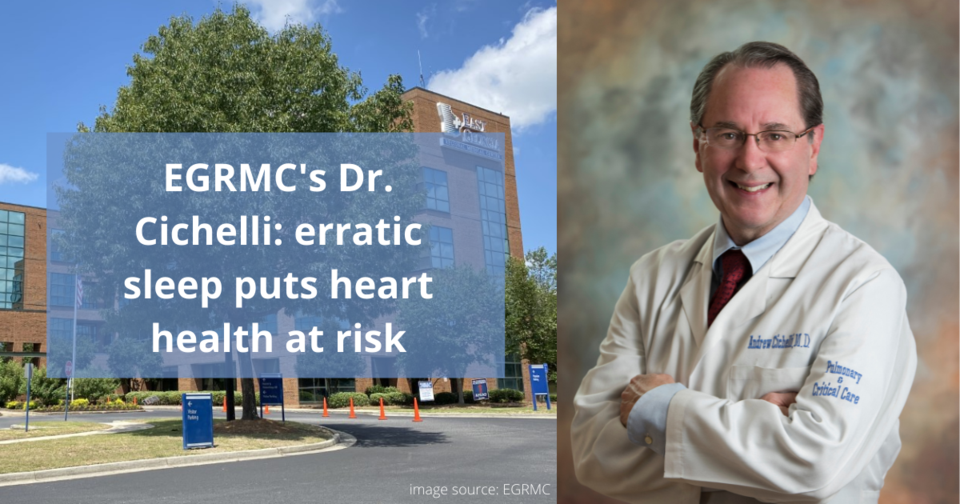Dr. Andy Cichelli, "Stay on schedule with a full night of sleep for your best physical and mental health."
We’ve all experienced the tiredness and lack of clarity that comes from a sleepless night, but a study published last year by the Journal of the American College of Cardiology Foundation found that sleep schedule inconsistency is also a risk factor for heart disease.
Andy Cichelli, M.D., pulmonology, sleep medicine, and critical care physician with East Georgia Pulmonary & Sleep Disorder Medicine and East Georgia Regional Medical Center (EGRMC), is making sure patients know how important it is to establish a regular pattern for going to bed and waking up.

Andrew Cichelli, M.D., pulmonology, sleep medicine, and critical care physician with East Georgia Pulmonary & Sleep Disorder Medicine and East Georgia Regional Medical Center
“Consistently getting a good night’s sleep is a foundation of good health,” stated Dr. Andy Cichelli. “An occasional night of tossing and turning is okay, but your overall health suffers if you have a lack of sleep that goes on for too long.”
The National Sleep Foundation has identified that from age 18 to 64 we need 7 to 9 hours of sleep, and at 65 or older we need 7 to 8 hours of sleep. Children and younger people have a need for more hours.
This time is needed so the body can perform a number of vital functions that support the health of your body and brain.
Three primary functions are repairing tissue, fighting off infection and processing memories of experiences from your day.
Higher variability in sleep duration or timing is associated with higher blood pressure, disregulated blood lipids and insulin resistance that can lead to diabetes. Insufficient sleep can affect your body in other ways too.
- Immune functioning is compromised as your body produces fewer antibodies so you’re more likely to get sick and the body has fewer resources to stave off illness, including cancers.
- Impulse control and appetite hormones can become unbalanced, promoting overeating and obesity.
- Mental functioning can be less for problem solving, reasoning, organizing, planning and executing plans.
- Learning is affected in all stages – your ability to encode new information, to consolidate and absorb the information and make new connections, and ability to remember and retrieve the information.
“The quality of your sleep is critical too,” Dr. Andy Cichelli further stated. “If you’re waking up tired or getting sleepy during the day, it could be a sign of other health issues such as sleep apnea.”
Many things can cause difficulties sleeping and sleep deprivation, including stress, sleep apnea and chronic insomnia.
Insomnia is often a symptom of stress or anxiety disorders that can make it difficult for you to relax enough to fall asleep and sleep soundly. Your physician can help diagnose whether you could benefit from medication or behavioral therapy or if a thorough sleep study is needed.
A physician referral is required to schedule a sleep study.
If you need help finding a primary care physician, visit www.EastGeorgiaMedSurgAssociates.com be connect with one East Georgia Medical and Surgical Associates’ qualified primary care physicians.
*East Georgia Regional Medical Center is owned in part by physicians.
SOURCES
- CDC - https://www.cdc.gov
- Huang T, Mariani S, Redline S. – Sleep Irregularity and Risk of Cardiovascular Events: The Multi-Ethnic Study of Atherosclerosis. Journal of American College of Cardiology, March 10, 2020 - https://pubmed.ncbi.nlm.nih.gov/32138974/
- The Sleep Revolution: Transforming Your Life, One Night At A Time, by Arianna Huffington, 201
- The organizational cost of insufficient sleep, by Nick van Dam and Els van der Helm, McKinsey Quarterly, February 2016. https://www.mckinsey.com/~/media/McKinsey/Business%20Functions/Organization/Our%20Insights/The%20organizational%20cost%20of%20insufficient%20sleep/The%20organizational%20cost%20of%20insufficient%20sleep.pdf




